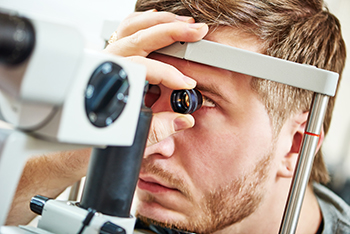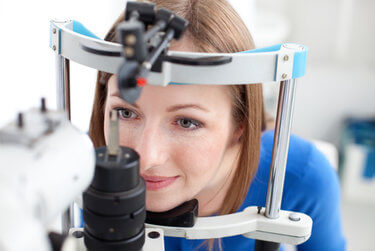Comprehensive Eye Exams
 Eye Exam in Burlington, VT
Eye Exam in Burlington, VT
Regular comprehensive eye examinations are a critical part of your routine health care. As you get older, your risk of having an eye problem – and therefore problems with your vision – increases. Often, these problems have no symptoms and go undetected. Therefore, having an eye checkup on a regular basis is essential to allow for early detection and treatment of any problems.
Some common items that are addressed at routine visits include testing your glasses prescription, evaluating for cataracts and glaucoma, screening for macular degeneration, addressing symptoms of flashes and floaters, and watching for damage related to diabetes.
Everyone should have their eyes screened at the age of 40. Based on that screening, we can determine the frequency of future follow-up exams. After the age of 65, all people should visit their eye doctor at least every 1-2 years.
If you have diabetes, you should have your eyes checked at least once per year, regardless of your age.
When it comes to the health of your eyes, you don’t want to take any chances. Many eye problems have no obvious symptoms, and they are detected only during an examination. Since early diagnosis may prevent future vision loss, having regular comprehensive eye exams is a critical part of your preventive healthcare regimen.

At your appointment for a full eye exam, we will review your past medical history, your medications, your history of previous eye problems, your family history of eye problems, and any symptoms that you are currently experiencing.
We will check your glasses prescription with a test called refraction, and we will assess your vision. We will also evaluate your pupils, the movement of your eyes, your peripheral vision, and the pressure inside of your eyes. A piece of equipment called a slit lamp is then used to examine the front structures of your eyes, including the eyelids, eyelashes, conjunctiva, sclera, cornea, anterior chamber, and iris.
Drops are placed in your eyes to dilate your pupils, and then the back structures of your eyes are evaluated, including the lens, vitreous, optic nerve, and retina.
Once the examination is complete, your eye doctor may need to perform some additional testing to gather more information. This additional testing usually involves a simple photo or a painless scan of the eye.
After all exam findings and test results have been reviewed, your eye doctor will discuss the health of your eyes with you, make treatment suggestions, and recommend how soon you should return for another eye exam.
If you live in Vermont, northern New York, or western New Hampshire and you are looking for a skilled eye doctor to perform a thorough eye examination for you, schedule an appointment at New England Vision today.
Please note that we will submit a bill for your examination to your medical insurance, but we do not accept Vision insurance plans.
Visit the American Academy of Ophthalmology’s EyeSmart® website to learn more about Eye Exams.



